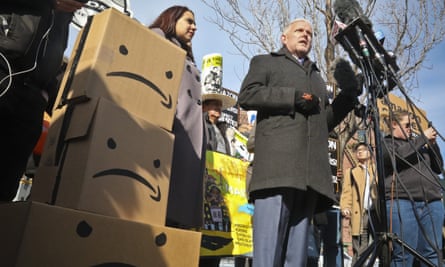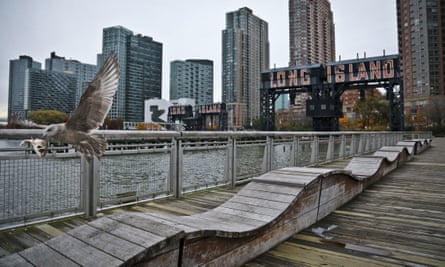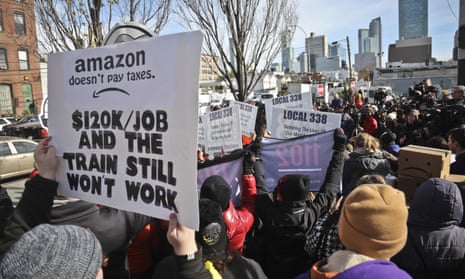Amazon picked a tough moment to come to New York.
Progressive groups were in the ascendant and they turned their fire on an obvious target: a plan to lure a company run by the world’s richest man with $3bn in subsidies and tax breaks.
The abrupt collapse of Amazon’s plan for a new headquarters, or HQ2, in Long Island City was a milestone victory for leftwing insurgents over establishment Democrats who backed the deal.
“This is a new day in New York City politics,” said Sasha Wijeyeratne, executive director of Caaav: Organizing Asian Communities.
“They sauntered in here and said HQ2 was inevitable,” she said. “Queens and New York City rose up, and we proved Amazon wrong.”
Grassroots activists joined forces with labor unions and leftist groups such as the Democratic Socialists of America, marching on Amazon’s bricks and mortar stores and going door to door to gather signatures in opposition to the project.
Local politicians, well aware of the influence of activists who helped unseat a longtime incumbent and elect Alexandria Ocasio-Cortez to the House of Representatives last year, joined the resistance. City councilman Jimmy Van Bramer and state senator Michael Gianaris became leaders in the fight to stop the project.

They were girding for a years-long fight but it turned out to be unnecessary. Amazon was dragged before the city council for hostile questions and opponents went beyond the New York deal to pound the global company over its labor practices and work with Immigration and Customs Enforcement on facial recognition technology.
Amazon opted not to stand and fight. With remarkable speed, executives called off their plans and left.
New York City’s mayor, Bill de Blasio, supported the project but thought Amazon should have anticipated the onslaught. This was New York, after all.
“Yeah, we are a tough city, but they should have known that coming in,” De Blasio told reporters, saying he was “flabbergasted” when an Amazon executive called to tell him the company was pulling out, not long before the decision was made public. He had expected the company to negotiate with its critics.
“There wasn’t a shred of dialogue,” he said. “Out of nowhere they just took their ball and went home.”
In Queens, activists were celebrating complete with a mariachi band, a piñata with a likeness of Amazon chief executive Jeff Bezos, and choruses of: “Hey, hey, hey, goodbye.”
“If they had good intentions, they would have stayed and figured it out,” said Maritza Silva-Farrell, executive director of Align. “I don’t think they ever would have, because of who they are.”
Amazon came promising jobs: 25,000 paying an average of $150,000 a year. But New York, unlike some HQ2 contenders that bet on Amazon to turn around slumping economies, has enjoyed years of economic growth, including a booming tech sector. In a bulletin after the collapse of the deal, S&P Global Ratings called it a “nonevent” for the local economy.
Opponents were more concerned about the cost of housing, saying rising rents in Queens would drive residents out of their homes. When pressed to remain neutral if their New York workers attempted to unionize, Amazon executives flatly refused.
“The tide is turning,” said Fahd Ahmed, head of the group Desis Rising Up and Moving. “People need good jobs and they can’t afford their rent.”

While opponents celebrated, some residents and business owners rued the death of the deal and expressed anger at what they saw as a betrayal by officials who bowed to the loudest voices.
“This was a gift,” said Josh Bowen, who owns John Brown Smokehouse near the site now dominated by warehouses and old industrial buildings where Amazon planned to build its campus. “Have you seen this neighborhood? It’s a dump over here.”
“They want to out-AOC AOC,” he said of local politicians channeling the rhetoric of Ocasio-Cortez. “One of the things I thought this new wave would do is breed a lot of leaders. It bred a lot of lemmings, is what it did. It bred a lot of robots.”
Polls showed that solid majorities of New Yorkers supported an Amazon campus in Queens. Tenant leaders at public housing developments spoke in favor of the project and unions for construction and building service workers supported the plan. But supporters never mobilized at the scale opponents did.
In a statement, Queensbridge Houses tenant association president April Simpson and other tenant leaders called the failure of the deal a “disaster” and blamed “grandstanding politicians” who “spread misinformation to whip up the small band of opponents”.
Frank Raffaele, founder of Coffeed, a Long Island City-based coffee shop chain, said he was “overjoyed” when he learned Amazon would be coming to Queens.
“We took it and we destroyed it. For no reason,” he said. “These socialists, whoever they are, these activists, they’re not doing the math on this. Their whole mindset is ‘No, no, no, no’.”
Raffaele said he understood Amazon’s decision to pull out in face of the torrent of criticism because: “They are not going to be bullied. They don’t want to be bashed all the time.”
